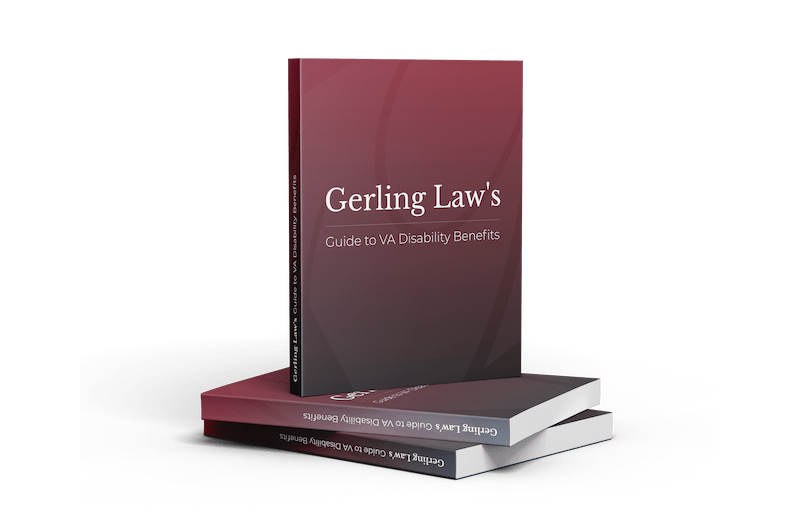The quick answer to the VA disability rating for tinnitus: A standalone diagnosis of tinnitus typically yields a 10% VA disability rating and $171.23 monthly compensation according to 2024 veterans disability compensation rates.

The U.S. Department of Veterans Affairs (VA) pays disability benefits to veterans who suffer from debilitating injuries or persistent medical conditions caused by their service.
But many former service members are unaware that the VA compensates those dealing with the irritating ear ringing known as tinnitus.
A large percentage of service members experience tinnitus because military life involves being subject to many loud noises.
Unlike civilians, military personnel frequently encounter explosions, gunfire, and banging caused by building, using, or repairing metal machinery. Exposure to these loud noises, particularly on a regular basis, can cause ongoing tinnitus.
While many veterans are familiar with this annoying and persistent ear ringing, they do not always realize that this condition constitutes a disability. But according to the VA’s 2021 Annual Report, tinnitus is the most prevalent service-connected disability among all veterans receiving disability benefits.
While the VA does not provide a large monthly benefit for a tinnitus rating alone, any amount can provide some breathing room in your budget.
So if your service has caused ongoing ringing or buzzing in your ears and you need help pursuing a claim, contact Gerling Law today.
What Is Tinnitus?
Tinnitus is a condition that causes veterans to hear noises in one or both ears. It is often subjective, meaning only the patient hears the noise.
In rare cases, others can detect the sounds as well. This condition is known as objective tinnitus.
Symptoms
Most people suffering from tinnitus describe hearing a ringing noise. It may come and go or happen all the time. The pitch and volume also may change.
According to the Mayo Clinic, others describe different sounds such as:
- Buzzing,
- Hissing,
- Clicking,
- Roaring, or
- Humming.
One form of objective tinnitus, called pulsatile tinnitus, makes a whooshing sound as though it is pulsing along with your heartbeat. Your doctor may be able to hear it as well.
Causes
As previously noted, the loud noises that are customary in military service often cause tinnitus.
However, other things may also lead to this sensation, including:
- Ear infection or blockage,
- Head and neck injuries, and
- Medications like nonsteroidal anti-inflammatory drugs or diuretics.
Less commonly, chronic health conditions, structural abnormalities in the ear, or injuries are the culprit.
Those with Ménière’s disease, a chronic ear disorder, have a greater chance of suffering from ringing ears. Older adults are also more susceptible to tinnitus.
Treatment
When an underlying medical condition causes tinnitus, doctors focus on treating the disease. And occasionally, tinnitus will go away on its own.
But in many cases, there is no treatment. For veterans whose ringing ears resulted from exposure to loud noises, the only option might be to manage the symptoms.
Options include the following techniques, which are designed to mask the noise or help the patient manage their reaction to the noise:
- Hearing aids—Many people with tinnitus also have hearing loss. Wearing hearing aids to increase your ability to hear other sounds decreases your focus on the ringing noise.
- White noise machines—Fans, humidifiers, headphones, or sound machines that produce constant sounds help make the tinnitus less noticeable. White noise machines also offer pleasant options like ocean waves or rain as well as static sounds.
- Relaxation techniques—Learning to implement relaxation tools can help ease the stress and frustration caused by constant auditory stimulation.
- Counseling—Therapy techniques like cognitive behavioral therapy and acceptance and commitment therapy aid some veterans in learning to refocus their attention away from their tinnitus.
Some of these treatment options may be covered by your VA healthcare benefits. Even if you receive a 0% rating—which means you have a service-connected disability, but it is non-compensable—you are entitled to VA healthcare.
The other treatment strategies will require out-of-pocket purchases. That is why it is important to file for a VA disability rating for tinnitus. The disability payment you receive will cover the cost of a white noise device or other distraction techniques.
Filing a VA Claim for Tinnitus
Though tinnitus almost always is subjective, you have a better chance of receiving a rating if you do more than just describe your symptoms on your application.
As with all VA disability claims, you should provide medical records showing that you have the condition and evidence that your tinnitus relates to your service.
Specifically, your tinnitus VA claim should include evidence of:
- A current tinnitus diagnosis from a medical professional;
- An event, injury, or disease that happened when you were on active duty; and
- A link between the current ringing in your ears and the service-related event.
Medical records or opinions are the best way to support this nexus. But it helps to submit buddy letters, proof of your service location, and other supporting documentation corroborating your claim.
VA Rating for Tinnitus
According to 38 C.F.R. § 4.87, Diagnostic Code 6260, the highest possible veteran disability rating for tinnitus in one or both ears is 10%.
The VA will only increase this percentage if they combine it with another rating for hearing loss, a peripheral vestibular disorder, or some other diagnostic code.
Monthly Benefit You May Receive
If you receive a tinnitus VA rating of 10%, the monthly benefit for 2024 is $171.23. This amount remains the same even if you have a dependent spouse, child, or parent.
Get Help with Your Tinnitus VA Claim
If you need help filing a tinnitus VA disability claim, the experienced professionals at Gerling Law Injury Attorneys can guide you. They also know how to navigate the appeals process if the VA has already denied your claim.
In fact, our lawyers wrote the book on obtaining benefits—Gerling Law’s Guide to VA Disability Benefits. Download it for free from our website, and then let one of our VA disability attorneys fight for the disability benefits you deserve.
You stood up for your country. Now we will make sure your country takes care of you.
We serve veterans around the country and even overseas. Call or reach us online today for a free consultation.



